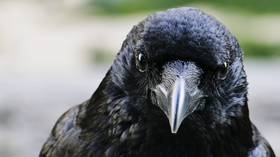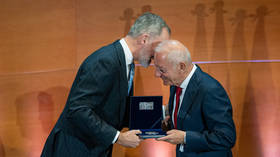Not so bird-brained: Scientists prove crows are capable of conscious thought for 1st time

It’s news that may unsettle fans of Alfred Hitchcock’s ‘The Birds,’ but scientists have proven that crows possess a form of consciousness and are smarter than they’ve been given credit for.
Corvids, or the crow and raven family of birds, are consciously aware of their environments and the short-term passage of time, which in turn, generates subjective experiences, the researchers found.
The team at the University of Tubingen in Germany conducted a series of experiments on two carrion crows (Corvus corone), in which they were each shown some 20,000 light signals over the course of dozens of sessions while electrodes monitored their brain activity.
The birds were trained to acknowledge the visual stimuli by nodding to show when they registered a flashing light.
Some of the lights were more faint and short, making them harder to spot, however, and this caused a divergence in the responses given by the pair, leading to differences of opinion or subjective experience.
“Nerve cells that represent visual input without subjective components are expected to respond in the same way to a visual stimulus of constant intensity,” animal physiologist Andreas Nieder of the University of Tubingen said.
“Our results, however, conclusively show that nerve cells at higher processing levels of the crow’s brain are influenced by subjective experience, or more precisely produce subjective experiences.”
Also on rt.com Scientists think Parkinson’s might be 2 diseases in 1, as fears grow Covid-19 may spark a wave of the disorderThe consciousness in question is called primary, or sensory, consciousness and was previously only thought to exist in primates. This latest research may force us to reconsider our definition of consciousness as well as the complexity of bird brains.
Awareness of oneself, one’s knowledge and the ability to reflect on that knowledge as well as apply it to one’s experiences in the world all fall under the umbrella of primary consciousness and add an extra dimension to problem-solving and decision-making behavior, for which crows are already known.
Primary consciousness is the most basic form as we understand it, and involves appreciation of and interaction with the world in the present, with some indication of a near past and near future.
We previously understood this level of consciousness as being associated with the cerebral cortex in mammalian brains but avian brains are, by contrast, much smaller and smoother.
However, another study which used 3D polarized light imaging Ruhr-University Bochum in Germany found that the cerebral architecture of bird brains is actually more similar to mammalian brains than we thought.
These findings suggest the existence of a pre-existing “ancient microcircuit” in the last common ancestors of humans and crows which lived 320 million years ago, which then evolved and developed in vastly different ways over the intervening millions of years, according to biopsychologist Martin Stacho.
In the meantime, the Tubingen researchers hope to continue their research and examine whether birds in fact possess secondary consciousness or awareness that they are aware.
Also on rt.com Apocalyptic scene in nuclear Russian city as birds fall from sky & lie scattered around streets (VIDEO)Think your friends would be interested? Share this story!













